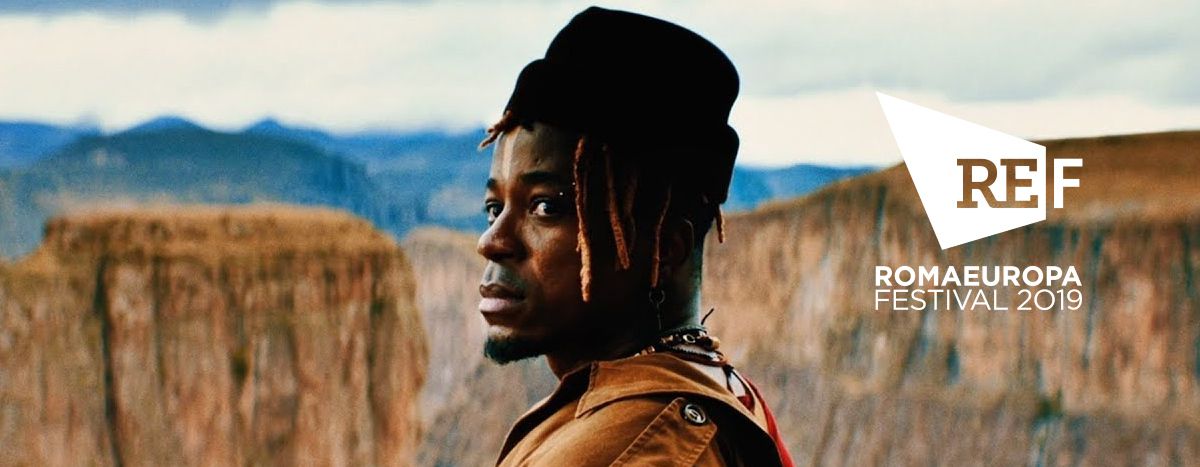
Blick Bassy: "Europe? It's a red line to cross"
Published on
Translation by:
Gabriel ButtigiegThe Cameroonian from the Bassa people, Blick Bassy, boasts of an artistic path which mixes African, Latin and American influences, guitars and banjos, violins and trombones. 1958, the concept album presented in Rome during the Romaeuropa Festival 2019, is dedicated to the death of Ruben Um Nyobé in the hands of French forces, the anti-colonial leader who fought for Cameroon's independence. Here is our conversation about music and politics.
1958 is dedicated to Ruben Um Nyobé, an anti-colonial leader who fought for an independent Cameroon and who was killed by French occupation forces. How can music spark reflection on politics and history? Or can it only do so in terms of producing moments of commemoration?
All actions are political. Um Nyobe often reminded us of this. Any action or inaction has an impact on our lives in one way or another. In a certain sense, we do politics every day, which happens consciously or unconsciously. After all, we are also called to vote based on our daily experiences. Music can cause a change on the level of social conscience, culture, economics as well as politics and citizenship towards the problems of a society. Music doesn't only serve to commemorate, celebrate or entertain, but also to raise awareness: to denounce and reclaim. This is confirmed by artists like David Bowie, Fela Kuti or Tiken Jah Fakoly.
If you were to compare the contemporary Ruben Um Nyobé to someone in the world today, who would you mention?
I believe the world has changed and that, unlike Um Byobé's era, people are no longer mobilised by charismatic leaders, but are ready to lead a battle for a particular community. Today, technology, via social networks, determines the possibility of creating groups that share the same reasons for acting in favour of and raise questions of emancipation. Consequently, the notion of "leader", on which the policy of the past was based, has expired. Movements like Black Lives Matter, Jilets Jaunes (Yellow Vests, ndr.) and Nuit Debout have demonstrated that now the leadership is collective.
Can you briefly explain what kind of country Cameroon is and how it has changed from 1958 to today?
Cameroon of today is a country that Ruben Um Nyobe wouldn't want to see. When African countries, like Cameroon right now, are led by leaders supported by colonisers of the past and govern more in their own interests rather than of the country itself, there can be no progress. Furthermore, the citizens of Cameroon have been alienated and separated from their culture. They have become a sort of avatar of the Western population; dreaming of building a state in the image and likeness of the latter's values. So, it becomes difficult to reconstruct. For example, today, in our territory, we're living in a war between the French and English secessionist: children of the same nationality are set up against each other.
What can you tell us about Cantin? How did you end up in a little village in the North of France? How has this experience influenced your music?
It was a significant change in my life. Living in Cantin, I frequently found myself confronting myself. These moments led me to reflect on the meaning of my life and then the music that I compose. Since then, I decided to emancipate myself from the rules of modern society. After six years in Cantin, I decided to move to a village in the southwest of France.
From 2015 to 2019, you've travelled all over the world. If you had to choose a place that impressed you the most, what would it be?
I fell in love with Brazil, a country which reminds me a lot of Africa, from the point of view of the heat transmitted by people, but also by the flora and fauna that recall the beauty of our Earth and the co-existence of diverse types of life.
In REF2019, you were included in a review titled "Diaspora." Literally, the word means "to disseminate." But, generally, the term has taken on a rather negative connotation, because of historical events in the past, wouldn't you say?
In reality, today diaspora has a more positive connotation if we think of the financial contribution that the communities which emigrated from a country pour back into the borders of the states of origin. Just think of the many places in which the diaspora communities finance the construction of schools, hospitals and start-ups.
What are the first things that come to mind when you hear the words Europe and Africa, respectively?
When I think of Europe, I think of a red line to cross. On the contrary, Africa makes me think of a red line that you might not be able to cross.
Can you tell us how Europe has influenced your work?
I was born and raised in Cameroon until I reached adulthood. Then, I lived in France and travelled the world for more than 10 years. This double experience has influenced my work because I fed on the meetings. Every day I immerse myself in the European reality, starting from the African base on which I built my identity.
Translated from Blick Bassy: «L'Europa? È una linea rossa da attraversare»



